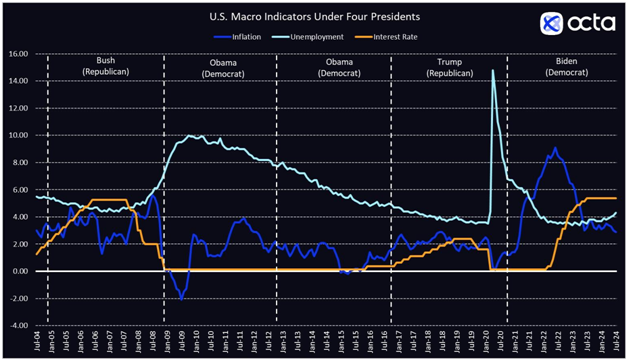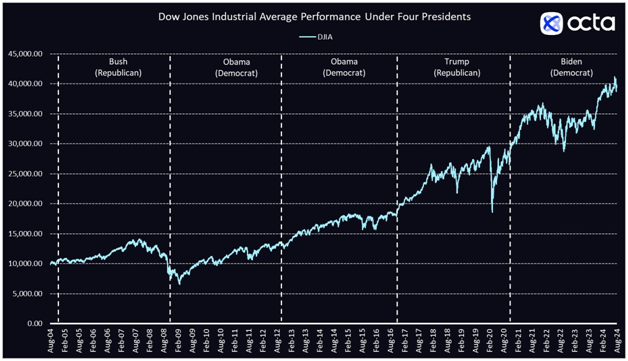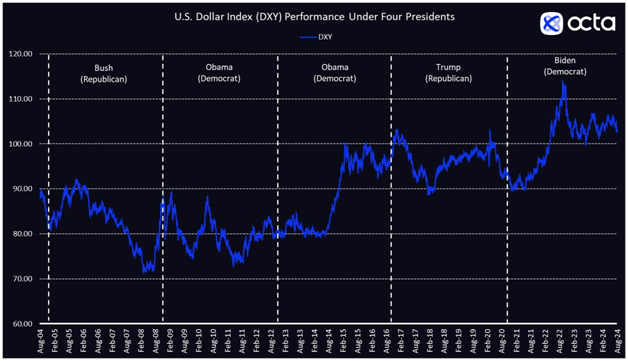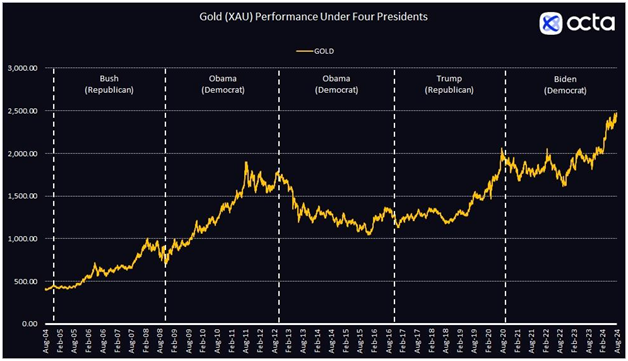- Financial markets are considered erratic and unpredictable during election times as investors weigh the possibility of major policy changes and economic upheaval.
- However, history shows that the US elections never led to anything extraordinary in terms of financial markets’ performance.
- Analysis of historical macroeconomic indicators fails to yield a conclusive correlation between presidential administrations and economic outcomes.
- The US stocks tend to become more unstable in the run-up to elections.
- The US dollar's value is influenced by how domestic and international markets perceive presidential candidates' economic policies.
- Due to its safe-haven status, gold typically experiences increased buying interest during electoral volatility.
Economy
The relationship between the party affiliations of the US presidents and economic growth has been a topic of extensive research and debate. Historically, some studies have suggested a correlation between the party in power and economic performance. For instance, data from the post-World War II era often shows that the US economy has grown faster under Democratic presidents than Republican presidents. However, this correlation does not necessarily imply causation.
Kar Yong Ang, the Octa analyst, said:
"Economic growth is a function of numerous variables, including global economic conditions, technological advancements, fiscal and monetary policies, and unforeseen events like natural disasters or pandemics. Therefore, attributing economic performance solely to the president's party affiliation can be overly simplistic and potentially misleading."
Indeed, the legislative branch also plays a crucial role in shaping economic policy. A president's ability to implement their economic agenda often depends on the composition of Congress. For example, a president facing a divided government may struggle to pass significant economic reforms, regardless of party affiliation.
Still, there is widespread belief that Democratic administrations tend to focus more on fiscal stimulus and social welfare programs, which can boost consumer spending and economic growth in the short term. On the other hand, Republican administrations often emphasize tax cuts and deregulation, which can stimulate business investment and long-term economic growth.
The US Key Macro Indicators Under Four Presidents (2004–2024)

Source: Octa
At the same time, both bad and good events happen, regardless of who is in the White House.
"Quite frankly, sometimes it's just pure luck that defines Presidents’ track record on the economy. For example, Obama entered the White House when the US economy was just about to start recovering following the great financial crisis of 2007–2008, whereas Trump may be said to be less fortunate as he faced the unprecedented Covid crisis during the final year of his presidency", says Kar Yong Ang, Octa’s analyst.
Overall, judging by historical macro indicators, there is no definite conclusion to make about which President is better for the economy.
US Stocks
The US stocks tend to experience increased volatility in the months leading up to an election. This is largely due to the uncertainty surrounding potential policy changes that could affect international trade, economic growth, and geopolitical stability. Therefore, market participants often engage in 'wait-and-see' behavior, holding off on major investment decisions until the election outcome is clear. Historically, the stock market tends to perform better in the year following an election, particularly if the incumbent party wins, as this suggests policy continuity.
While elections can certainly stir immediate reactions, historical data reveals that their long-term impact on financial markets tends to be limited. Market performance over the medium to long term is more often influenced by broader economic parameters like inflation trends rather than who wins the election.
Dow Jones Industrial Average (DJIA) Performance Under Four Presidents (2004–2024)

Source: Octa
Historically, sectors like healthcare, energy, technology, and finance react differently to election results due to their sensitivity to legislative changes. The 2016 US election serves as a notable example of markets reacting strongly to the election results, anticipating tax cuts and regulatory reforms that boosted market sentiment.
US Dollar
Both domestic and international perceptions of the candidates' economic policies influence the US dollar's performance during the election years. A candidate perceived as fiscally conservative might strengthen the dollar due to expectations of reduced government spending and lower inflation. Conversely, a candidate favoring expansive fiscal policies could lead to a weaker dollar due to concerns over increased debt.
Trade policies are another crucial factor. A candidate with a protectionist stance might introduce tariffs or renegotiate trade deals, which can affect the dollar's value. Protectionist policies can lead to a stronger dollar in the short term due to reduced imports, but they might also result in retaliatory measures from trade partners, which could weaken the dollar in the long run.
Geopolitical stability and foreign relations are additional aspects that can affect the dollar during the election periods. A candidate perceived as more stable and predictable in foreign policy might boost the investors' confidence, leading to a stronger dollar. On the other hand, a candidate whose policies are seen as potentially destabilizing could lead to a weaker dollar as investors seek alternative assets.
The U.S Dollar Index (DXY) Performance Under Four Presidents (2004–2024)

Source: Octa
Over the past 20 years, the US Dollar Index (DXY) has performed better under Democratic Presidents and had negative returns under Republican leadership. However, as with the US stock indices, it’s crucial not to oversimplify this trend. The US dollar is a global reserve currency influenced by a myriad of factors beyond just presidential policies.
Gold
Gold, considered a safe-haven asset, typically sees increased demand during election periods marked by uncertainty. Historical data indicates that on a micro level, gold prices tend to rise in the months leading up to an election and may continue to do so if the election results are contested or lead to significant policy shifts. However, Kar Yong Ang, an Octa analyst, notes:
"If we look at the bigger picture, we see that gold price just generally tends to increase in the long-term and the ideological stance of an incumbent US President has very little or no impact on its performance".
Indeed, the value of gold almost doubled during President Obama's first term in office but experienced a 30% decline during his second term.
Gold Performance Under Four Presidents (2004–2024)

Source: Octa
According to a study by the World Gold Council (WGC), gold typically performs slightly better in the six months leading up to a Republican president's election and stays flat afterwards. On the other hand, it tends to underperform before a Democratic president's election and performs just below its long-term average in the six months post-election period. However, WGC admits that these results are statistically insignificant and that gold is responding not to the party affiliation of an elected President but, more likely, to the expected effect of specific policies.
